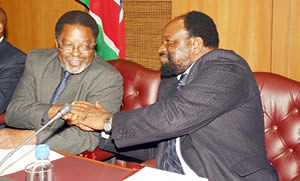
Republic of Zimbabwe Foreign Minister Simbarashe Mumbengegwi attending the African Union Extraordinary Session in Addis Ababa, Ethiopia on May 25, 2011. Zimbabwe was selected to head the Peace and Security Council., a photo by Pan-African News Wire File Photos on Flickr.
Zim to chair AU security council
Friday, 27 May 2011 22:19
Foreign Affairs Minister Simbarashe Mumbengegwi
By Hebert Zharare
Zimbabwe Herald
ZIMBABWE will next week assume the chairmanship of the African Union Peace and Security Council, the only AU organ with the mandate to enforce union decisions.
South Africa currently holds the organ's powerful post.
Foreign Affairs Minister Simbarashe Mumbengegwi, on Thursday said the country's major task was to continue with the implementation of the extraordinary Summit of AU Heads of State and Government's resolutions on Libya and other troubled spots on the continent.
"Yes, we are taking over chair of the AU Peace and Security Council. We want to see to it that so-me of the decisions made by the AU's extraordinary Summit of Heads of State and Government are expeditiously implemented," he said.
Members of the AU Peace and Security Council hold the rotational position on a monthly basis.
The Peace and Security Council was established in 2002 to:
--Promote peace, security and stability in Africa, in order to guarantee the protection and preservation of life and property, the well-being of the African people and their environment, as well as the creation of conditions conducive to sustainable development.
--Anticipate and prevent conflicts.
In circumstances where conflicts have occurred, the Peace and Security Council shall have the responsibility to undertake peace-making and peace-building functions for the resolution of these conflicts.
--Promote and implement peace-building and post-conflict reconstruction activities to consolidate peace and prevent the resurgence of violence.
--Co-ordinate and harmonise continental efforts in the prevention and combating of international terrorism in all its aspects.
--Develop a common defence policy for the Union, in accordance with article 4(d) of the Constitutive Act.
--Promote and encourage democratic practices, good governance and the rule of law, protect human rights and fundamental freedoms, respect for the sanctity of human life and international humanitarian law, as part of efforts for preventing conflicts.
The organ is composed of 15 members elected on the basis of equal rights, 10 members elected for a term of two years and five members elected for a term of three years to ensure continuity.
Zimbabwe, South Africa and Namibia represent the Southern region, Mauritania and Libya the North, Djibouti, Rwanda and Kenya are from the Eastern region, Burundi, Chad and Mali from Central Africa, while Benin, Nigeria, Cote d'Ivoire and Equatorial Guinea represent West African states.
After a marathon meeting that started late afternoon on Wednesday and ended at 2:30am on Thursday, the AU security organ raised a number issues they wanted implemented to end the bombardment of Libya.
The leaders condemned the way the UN Secu-rity Council resolution 1973 of 2011 was being abused by NATO forces.
The AU was of the opinion that NATO members got the resolution under false pretences yet the agenda was to effect regime change.
The summit resolved that the AU roadmap which had been adopted by the High Level Panel of the bloc be implemented.
The adopted roadmap entails that there must be a ceasefire for dialogue to take place among parties in the Libya conflict.
The parties in the meeting were very clear that it's the Libyans who were supposed to determine their destiny, not NATO forces.
They then resolved that the UN Security Council should be impressed upon and meet as a matter of urgency in order to revisit and review the implementation of resolution 1973 of 2011.
There are also reports that NATO members were taking advantage of the fact that Libya belonged to a number of organisations besides the AU that include the Mediterranean and the Arab Leagues.
No comments:
Post a Comment